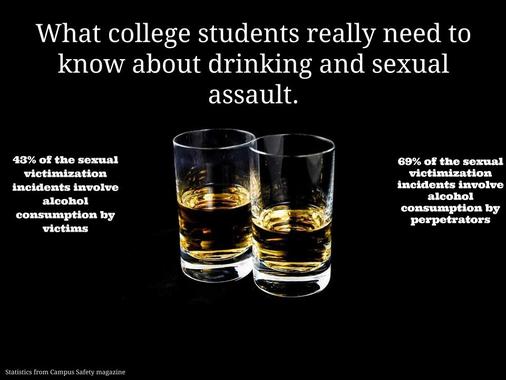|
By Sara Forcella, See the Triumph Contributor
College is a time of vast change for young adults. It is also a time of many firsts, which could involve your first time living on your own, first time having a roommate, first time taking college-level courses, first committed romantic relationship, and possibly first time drinking alcohol. While not all students on college campuses drink, many do. College culture as a whole is affected largely by the influence of alcohol and the sense of comradery that occurs among students who live together on campus. However, alcohol also inhibits students' decision making skills. Therefore, as a sexual violence prevention educator, I believe that ignoring the amount of drinking that takes place on college campuses is not only counterproductive, it's downright dangerous! The danger of ignoring students’ use of alcohol lies not only within the alcohol drinking alone, but its connection to sexual assault. On college campuses, perpetrators of sexual assault use the consumption of alcohol as a tool to reduce their victims’ decision making and motor skills. It’s important to note that alcohol is not the cause of sexual assault on college campuses--the perpetrators themselves are the only ones to blame. Nevertheless, the use of this drug to inhibit victims is clearly identifiable. Consider this: research shows that as many as 90% of all rapes on college campuses occur when either the perpetrator or victim was using alcohol (Brown University, Health Promotions). Where does this statistic leave parents, educators, and students? Does it mean that we don’t send our children off to college? Or that even college students over the age of 21 shouldn’t be allowed to drink? Neither of these seem to be the answer--but what is? For me, the answer lies in education. Just like with any other health concern, we must educate students about sexual assault before they attend college and again while they are on campus. Research shows that women in late adolescence to early adulthood are at the highest risk of being sexually assaulted. Therefore, we must educate young women that sexual assault is a daily risk, with or without the consumption of alcohol, especially for those between the ages of 18 and 24 (Collins & Messerschmidt, 1993). Furthermore, when alcohol is added to the equation, women are even more at risk for being sexually assaulted. Most importantly though, we need to educate women that sexual assault is never okay and that it is never their fault. But we can’t stop there! We can’t just educate half of the population and make it their responsibility to fend off criminals. Research also shows that most perpetrators of sexual assault are men (Sedgwick, 2006). Instead of victim blaming, lets hold the perpetrators accountable! We need to teach them that just because a partner has agreed to some level of intimacy, it does not mean they are entitled to take it farther, and that if they do so without permission, it’s sexual assault. They should know that getting sex by using coercion and manipulation are in fact forms of sexual assault. Men need to understand that feeding someone drinks in order to make obtaining sex easier is sexual assault. It’s our responsibility to teach men to look for ‘enthusiastic consent’ before engaging in sexual activity, instead of acting upon a lack of a ‘no.’ Finally, men need to face the reality that if somebody reports that they were sexually assaulted while drunk, it can not only change their own lives, but also that survivor’s life. It’s not only women who are affected by sexual assault on campus, men are too. Women, like men, can be perpetrators of sexual assault. It’s our responsibility to teach both men and women (beginning at a young age) to understand personal boundaries. This means asking for consent before engaging in any kind of intimate act, whether it be as silly as tickling or as serious as sex. When it comes to alcohol, both men and women need to know that if either party is intoxicated that they can not legally give consent. Alcohol has the potential to change things, and it only takes a matter of seconds to violate, shame, degrade and sexually assault someone--therefore before these things are ever able to happen, let’s take the time to educate our young adults.
3 Comments
5/25/2022 12:34:38 am
Very much appreciated. Thank you for this excellent article. Keep posting!
Reply
7/9/2024 12:17:32 am
Shop the best facial mask for women & men at wholesale price. we offer a variety of face packs like aloe vera, vitamin C, charcoal and skin whitening. shop now.
Reply
Leave a Reply. |
Archives
July 2024
CategoriesAll About Intimate Partner Violence About Intimate Partner Violence Advocacy Ambassadors Children Churches College Campuses Cultural Issues Domestic Violence Awareness Month Financial Recovery How To Help A Friend Human Rights Human-rights Immigrants International Media Overcoming Past Abuse Overcoming-past-abuse Parenting Prevention Resources For Survivors Safe Relationships Following Abuse Schools Selfcare Self-care Sexual Assault Sexuality Social Justice Social-justice Stigma Supporting Survivors Survivor Quotes Survivor-quotes Survivor Stories Teen Dating Violence Trafficking Transformative-approaches |
Search by typing & pressing enter



 RSS Feed
RSS Feed